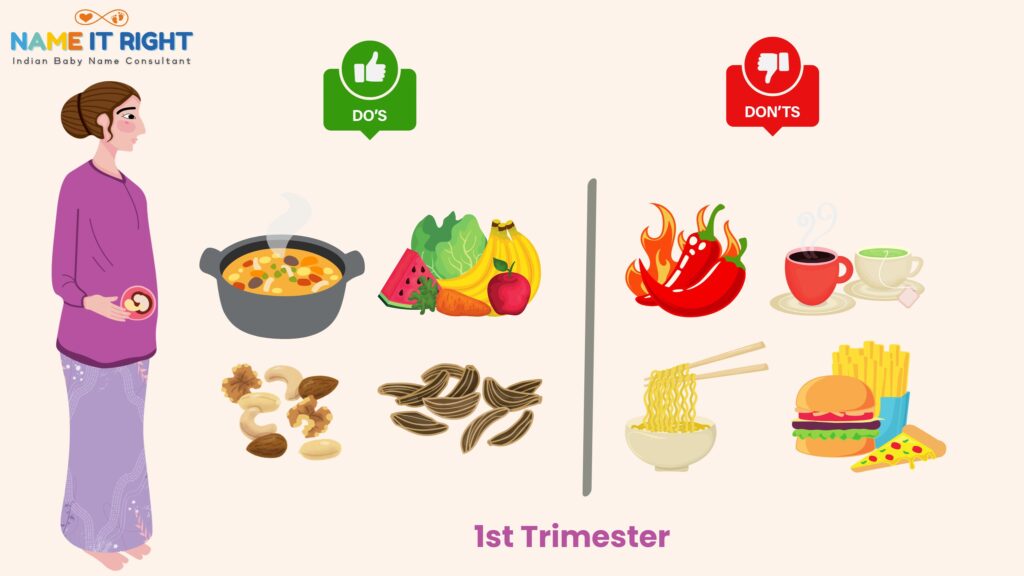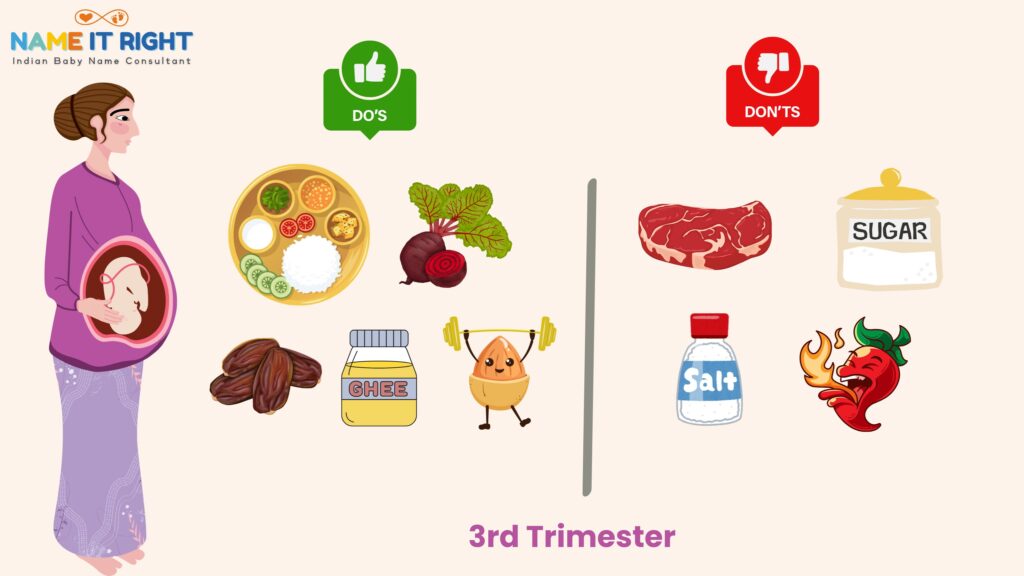
The Ayurvedic Approach to Pregnancy
In Ayurveda, pregnancy is considered a time of “Sattvic” (pure) and “Ojas” (vital energy) formation. Ojas plays a crucial role in building the baby’s strength and immunity. Ayurvedic wisdom emphasizes eating wholesome, fresh, and nourishing foods to enhance Ojas and promote both the mother’s and baby’s overall health.
Ayurveda focuses on the following principles during pregnancy:
-
Balance the Doshas: Every individual has a unique constitution (Vata, Pitta, and Kapha). The Ayurvedic pregnancy diet is designed to balance these doshas to ensure optimal health for both mother and baby.
-
Increase Digestive Fire (Agni): According to Ayurveda, a strong digestive fire is essential to assimilate nutrients properly. Eating easily digestible foods and following a proper routine ensures that Agni remains strong, enabling the body to process nutrients effectively.
-
Holistic Nourishment: Ayurveda doesn’t just look at physical nourishment but also emphasizes mental and emotional well-being. Foods that promote calmness and positivity are often recommended.
First Trimester: Nurturing the Beginning
The first trimester is the early stage of pregnancy, when the baby’s organs are developing and the body is adapting to the new changes. Ayurveda suggests a diet that nourishes the developing fetus while providing energy and maintaining balance in the mother’s body.
Foods to Include:
-
Warm, Cooked Foods: In Ayurveda, raw and cold foods are believed to disturb digestion, especially during the first trimester. Opt for warm, cooked foods like soups, stews, and porridges to promote good digestion.
-
Fresh Fruits and Vegetables: Incorporating a variety of seasonal fruits and vegetables is crucial. Ayurveda recommends foods that are sweet, moist, and mildly warming. For example, apples, pears, carrots, and spinach are highly beneficial.
-
Nuts and Seeds: Almonds, walnuts, and pumpkin seeds are recommended for providing essential fats and proteins, which are vital during this stage.
-
Herbs for Support: Certain herbs like ginger and fennel are excellent for easing nausea and improving digestion, both of which are common in the first trimester.

Foods to Avoid:
-
Spicy, Fried, or Oily Foods: These can disrupt digestion and increase heat in the body, which may lead to discomfort, acidity, or heartburn.
-
Caffeinated Beverages: Avoid caffeine during the first trimester as it may interfere with nutrient absorption and disturb sleep.
-
Heavy, Processed Foods: Foods that are difficult to digest or overly processed should be avoided to maintain healthy digestion.
Second Trimester: Supporting Growth and Development
The second trimester is a time of rapid growth for the baby. The organs and body systems are continuing to develop, and this stage also brings an increase in energy for the mother. Ayurveda stresses the importance of eating nutrient-dense foods to support the baby’s development.
Foods to Include:
-
Whole Grains: Whole grains like quinoa, rice, barley, and oats are excellent sources of complex carbohydrates and fiber, which help sustain energy levels and maintain healthy digestion.
-
Proteins: Lentils, chickpeas, mung beans, and paneer are recommended as protein sources, essential for the growth of tissues and muscles. Ayurveda suggests combining different types of legumes for complete protein intake.
-
Healthy Fats: Healthy fats from sources like ghee (clarified butter), coconut oil, and avocados are crucial for fetal brain development and hormone production.
-
Leafy Greens and Leafy Vegetables: Spinach, fenugreek leaves, and drumstick leaves are packed with iron, calcium, and folate, which are essential for both maternal health and the baby’s growth.
-
Dairy Products: Ayurveda recommends consuming organic, fresh dairy products like milk, yogurt, and buttermilk to enhance Ojas and provide calcium.

Foods to Avoid:
-
Cold and Refrigerated Foods: Cold foods are considered hard to digest in Ayurveda and can negatively affect the mother’s digestion.
-
Excessive Salt: High sodium intake can lead to water retention and high blood pressure, so it’s best to avoid processed and salty foods.
Third Trimester: Preparing for Birth
The third trimester is a crucial period where the baby is preparing for birth, and the mother’s body is also preparing for labor. The emphasis in Ayurveda during this period is on strengthening and nourishing the body while keeping it calm and balanced.
Foods to Include:
-
Easily Digestible Foods: The third trimester often brings digestive discomfort. Eating lighter foods like khichdi (a dish made of rice and lentils) and well-cooked vegetables can help ease digestion.
-
Iron-Rich Foods: To prevent anemia, iron-rich foods such as beetroot, pomegranate, dates, and leafy greens should be included in the diet.
-
Warm Herbal Teas: Herbal teas made from ingredients like cinnamon, ginger, and cardamom help to soothe the body and aid digestion. Ayurveda suggests drinking warm teas to maintain the body’s balance and aid circulation.
-
Protein-Rich Foods: Continue to include plant-based proteins, nuts, seeds, and dairy for optimal tissue development and immunity.
-
Ghee: Ayurveda recommends ghee for healthy fat intake. It helps in lubrication and keeping the body’s tissues well-nourished, especially in the final stages of pregnancy.

Foods to Avoid:
-
Excessive Sugar and Sweets: Too much sugar can lead to gestational diabetes and other complications. Stick to natural sweeteners like honey or jaggery in moderation.
-
Heavy, Hard-to-Digest Foods: Foods like red meat or excessively spicy foods should be avoided as they may cause discomfort and bloating.
Ayurvedic Herbs and Spices for Pregnancy
Ayurveda uses a variety of herbs and spices to support pregnancy, aid digestion, and improve overall well-being. Here are some commonly used herbs and spices during pregnancy:
-
Ginger: Known for its anti-nausea properties, ginger can be consumed in moderation to ease morning sickness and digestive issues.
-
Turmeric: This powerful anti-inflammatory herb is known for its ability to improve digestion, boost immunity, and promote skin health.
-
Cumin and Coriander: Both of these spices aid digestion and help reduce bloating and gas, common pregnancy issues.
-
Fennel Seeds: Fennel is excellent for improving digestion and preventing constipation, a common pregnancy concern.
-
Fenugreek: Fenugreek seeds are known to increase milk production postpartum and may also help control blood sugar levels.
Conclusion: Embracing Ayurvedic Wisdom for a Healthy Pregnancy
An Ayurvedic diet during pregnancy is all about balance—nourishing the body, calming the mind, and ensuring that both the mother and baby receive the essential nutrients for health and growth. Ayurveda emphasizes wholesome, easily digestible, and nourishing foods that are in harmony with the natural rhythms of the body.
By following Ayurvedic guidelines, expecting mothers can create a well-rounded diet that supports a healthy pregnancy. From the first trimester’s gentle nourishment to the third trimester’s preparation for childbirth, Ayurveda offers time-tested wisdom for maintaining optimal health throughout this beautiful journey.
Remember to consult an Ayurvedic practitioner or healthcare provider to tailor a diet plan that best suits your individual needs and dosha, ensuring that both you and your baby thrive during this transformative period.
Also Read:
A Parent’s Guide to Common Medicines for Indian Babies (0-2 Years)
